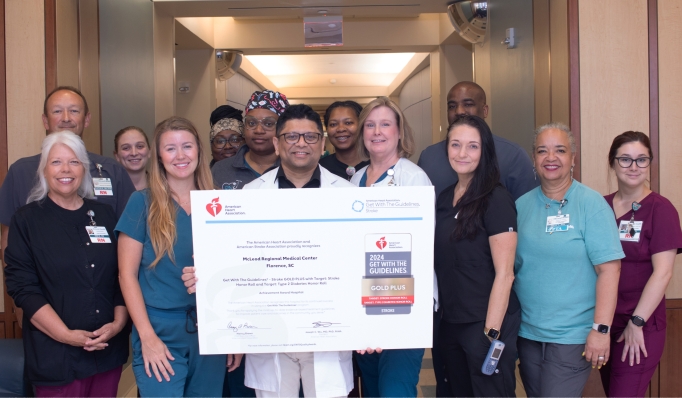McLeod Nationally Recognized for High-Quality Stroke Care

The American Heart Association presents the Get With The Guidelines award
for proven dedication to best practices and life-saving care.
McLeod Health has received the American Heart Association Get With The Guidelines® achievement award for their commitment in the treatment of stroke, which ultimately leads to more lives saved, shorter recovery times and fewer readmissions to the hospital.
Every 40 seconds, someone in the United States has a stroke or heart attack. Heart disease and stroke are the number one and number five causes of death in the United States, respectively. Studies show patients can recover better when providers consistently follow treatment guidelines.
Get With The Guidelines puts the expertise of the American Stroke Association to work for hospitals nationwide, helping ensure patient care is aligned with the latest evidence- and research-based guidelines. As a participant in the Get With The Guidelines program, McLeod qualified for the award by demonstrating how their organization has committed to improving quality care.
“McLeod streamline processes to ensure timely and proper care for strokes,” said Jack O’Conner, Vice President of Neuroscience, McLeod Health. “Get With The Guidelines programs make it easier for our teams to put proven knowledge and guidelines to work on a daily basis, which helps us ensure more people in our regions experience longer, healthier lives.”
The American Heart Association presented the following recognitions to:
McLeod Regional Medical Center: Stroke GOLD Plus with Target: Type 2 Diabetes Honor Roll; Stroke Honor Roll
McLeod Health Cheraw: Stroke GOLD Plus with Target: Type 2 Diabetes Honor Roll; Target Stroke Honor Roll Elite, Rural Stroke Silver Achievement Award
McLeod Health Seacoast: Stroke GOLD Plus with Target: Type 2 Diabetes Honor Roll; Target Stroke Honor Roll Elite
McLeod Health Loris: Stroke SILVER Plus with Target: Type 2 Diabetes Honor Roll
“These awards show the commitment McLeod has in caring for those in their community who need stroke care,” said Donald Lloyd-Jones, chair of the American Heart Association Quality Oversight Committee and chair of the Department of Preventive Medicine at Northwestern Medicine. “By following the American Heart Association’s quality improvement protocols, McLeod can help realize our shared vision of improved patient outcomes, fewer readmissions and lower mortality rates – a win for health care systems, families and communities.”
Every minute counts for stroke patients. B.E. F.A.S.T. can lead patients to the stroke treatments they desperately need.
If you think someone may be having a stroke, remember the acronym B.E. F.A.S.T. and do this simple test:
B-BALANCE: Does the person have a loss of balance?
E-EYES: Have they lost vision in one or both eyes?
F-FACE: Does one side of the face droop?
A-ARMS: Ask the person to raise both arms. Does one arm drift downward?
S-SPEECH: Is their speech slurred or strange?
T-TIME: If you observe any of these signs, call 9-1-1 immediately.
If you or a loved one experience any of these symptoms it should prompt you to realize that you may be having a stroke. Once symptoms start it is crucial to get treatment as quickly as possible to make it less likely that any damage becomes permanent. Call 911 and get to the nearest emergency department.
-
McLEOD REGIONAL MEDICAL CENTER FLORENCE
843-777-2000 -
McLEOD DARLINGTON
843-777-1100 -
McLEOD DILLON
843-774-4111 -
McLEOD LORIS
843-716-7000 -
McLEOD SEACOAST
843-390-8100 -
McLEOD CHERAW
843-537-7881 -
McLEOD CLARENDON
803-433-3000



-
McLEOD REGIONAL MEDICAL CENTER FLORENCE
843-777-2000 -
McLEOD DARLINGTON
843-777-1100 -
McLEOD DILLON
843-774-4111 -
McLEOD LORIS
843-716-7000 -
McLEOD SEACOAST
843-390-8100 -
McLEOD CHERAW
843-537-7881 -
McLEOD CLARENDON
803-433-3000
 Find a Doctor
Find a Doctor  Locations
Locations  Services
Services